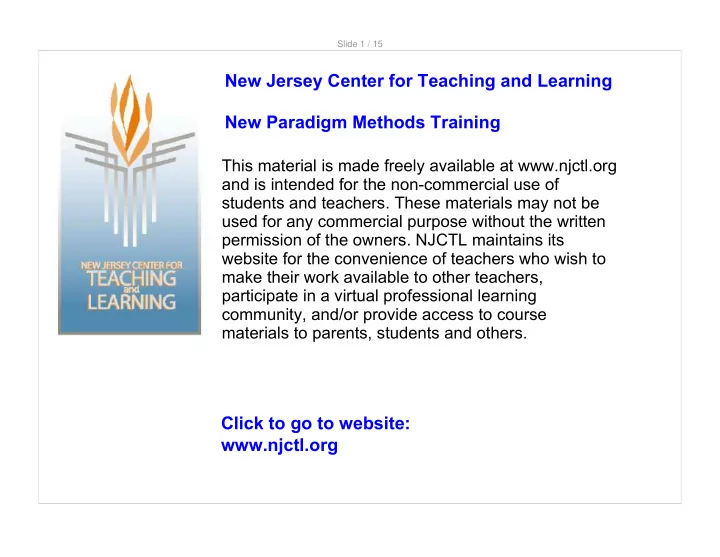

Slide 1 / 15 New Jersey Center for Teaching and Learning New Paradigm Methods Training This material is made freely available at www.njctl.org and is intended for the non-commercial use of students and teachers. These materials may not be used for any commercial purpose without the written permission of the owners. NJCTL maintains its website for the convenience of teachers who wish to make their work available to other teachers, participate in a virtual professional learning community, and/or provide access to course materials to parents, students and others. Click to go to website: www.njctl.org
Slide 2 / 15 Welcome to Parent Information Night
Slide 3 / 15 What is Physics? Physics is the study of: How things move and their forces Electricity and Magnetism Light and Sound How atoms function
Slide 4 / 15 Don't you need calculus to study physics? Only if objects move in directions besides up and down, or side to side. In Algebra-Based Physics, we keep the math simple by only having those two directions of movement.
Slide 5 / 15 What is PSI? PSI stands for "Progressive Science Initiative" which is a method for teaching science.
Slide 6 / 15 Is PSI new? How many students have been taught using these methods? PSI is used in roughly 160 schools in CO, NJ, VT, as well as Argentina and the Gambia, with over 4500 teachers registered as users of the program.
Slide 7 / 15 How is PSI different from other science programs? There are several main differences: · Students take a physics-chemistry-biology sequence. · Formative assessments built into presentations allow teachers to check for understanding frequently · Learning in general is more important than when that learning takes place. Students can retake exams as many times as needed for mastery. · Course materials are all sourced from njctl.org, allowing parents to access materials as well · Homework is a tool towards mastery. Homework is assigned, but not graded.
Slide 8 / 15 What does a PSI classroom look like? This class happens to be in the Gambia, but ideally it is the same everywhere. Students are working in groups to solve problems and using responders to give answers. In general, you see widespread engagement.
Slide 9 / 15 It has been shown that people, students in particular, learn more material at faster rates when they can work together at problems that are just above their understanding. Here is an example we like to use to show this. Look at the next slide by yourself and see if you find the hidden meanings in the marketing images. After 1 minute, work with those at your table to figure all of them out.
Slide 10 / 15 arrow going from a to z, saying they have everything from a to z hidden arrow Before merging with Delta, Northwest logo, the circle also serves as a compass, pointing NW 2 people sharing a chip over a bowl of salsa Penn State became the 11th member, until the University of Nebraska-Lincoln became the 12th, then a new logo came out hidden bear, because candy bar comes from Bern, Switzerland, bike rider hidden kiss sideways a city named for a bear
Slide 11 / 15 How can I help my child in physics if I never took physics, or it has been a long time since I took it? Here are a few recommendations: · Help your child believe there is an answer to every question. If they are stuck, suggest they look back through their class notebook for helpful examples. · Use the formula sheet. · Go to njctl.org and open the "algebra based physics" course.
Slide 12 / 15
Slide 13 / 15 Open the .pdf file, and you will find icons like this: You can click on that icon, and it will link you directly to a YouTube video that explains the concept on that page.
Slide 14 / 15 Your child will be given a formula sheet. Additionally, You can always download a copy from the website.
Slide 15 / 15 What if my child needs extra help? Extra help is available M-Th in room G111. Students can get help or retake tests. A few rules about retakes: · students MUST get extra help, and a teacher's signature before they may take the make up exam. · Retakes must be completed before the next unit exam is given.* *there is some wiggle room for students who consistently come for extra help, or have longer term illnesses.
Recommend
More recommend